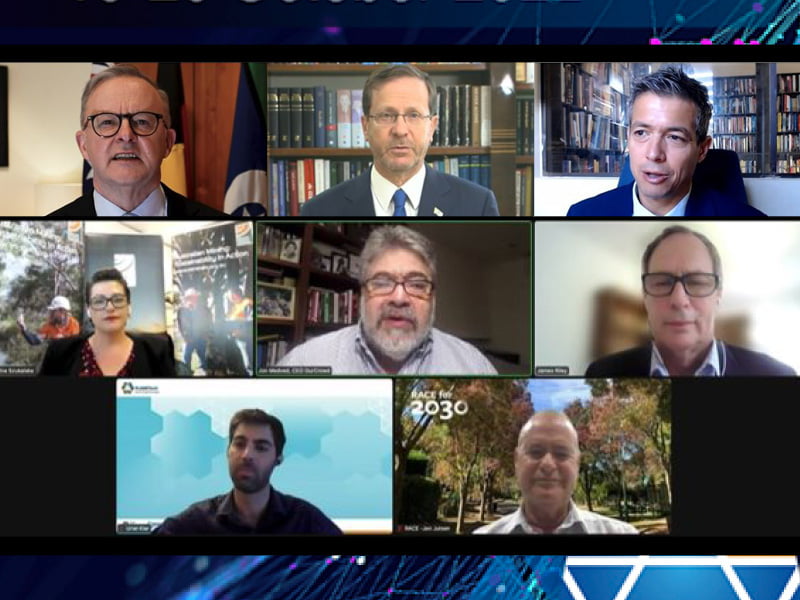The ClimateTech sector represents a massive opportunity, for no other reason than it to addresses massive climate challenges.
But despite this, activity in the ClimateTech sector remains “so far off the pace it’s a joke”, and is a long way from what is needed for the world to make an impact in meeting those challenges, according to RACE for 2030 CRC chief executive Jonathan Jutsen. The world needs to be on what he calls a “war footing” in relation to investing in new research and innovation to address climate change.

Speaking as part of a panel conversation at the Australian-Israel Innovation Summit 2022 – facilitated by the Australia-Israel Chamber of Commerce – Mr Justsen, said there is now substantial founder and investor interest in ClimateTech, but its still not nearly as much as is needed.
“We’re so far off the pace it’s a joke,” Mr Jutsen said on the panel. “We’ve got to realise that we have to put this thing on a war footing. It has to be on a scale that’s completely outside of what we’re doing right now.”
“This is not a green shoots moment. If we’re going to get anywhere near it we’re going to have to go at orders of magnitude greater pace than we are now, and that’s only going to happen with a massive mobilisation, including from government providing some real leadership and funds in this space.”
Uriel Klar, the director at Israel-based climate innovation ecosystem PLANETech, agreed with Mr Jutsen and said that while he’s optimistic about ClimateTech, he remains pessimistic about climate change in general.
“We know that climate change will be worse – this is not a prediction. This fact tells me that ClimateTech will actually grow. There’s a correlation where we see more bad things happening and more money invested in ClimateTech,” Mr Klar said on the panel.
“So I’m optimistic about ClimateTech. The pessimism in climate change is just acknowledging the reality. Unlike Covid when governments and people understood clearly they needed to act immediately, with climate change that’s not happening.”
ClimateTech is becoming a lucrative business opportunity, and entrepreneurs are beginning to move into the space, OurCrowd founder and chief executive Jonathan Medved said.
“You’re seeing a phenomenon of people who are serial entrepreneurs like I am, who have taken successful careers in cybersecurity and in artificial intelligence and are now moving and leaning fast into climate,” Mr Medved said on the panel.
“We need to collect and to raise not billions, and not tens of billions, but literally hundreds of billions and I daresay trillions of dollars in capital that is not just going to be invested in public stocks who promise to be good, but is going to be invested in creating real solutions. Because the solutions are out there – the entrepreneurs are ready and now the investor class has to respond.”
OurCrowd manages $2 billion in assets and a portfolio of 365 companies. Of these, a third of investments are impact-orientated, Mr Medved said.
It’s important that more successful tech founders and entrepreneurs are encouraged to shift into the climate tech sector, Mr Medved said.
“We know that software is going to eat the world, it might also save the world if we can figure out a way to take all of this wonderful tech energy which has been focused on getting the next ad-bot to eek more money out of a TikTok influencer, and moving that to solve the problems that are going to allow us to live productively and healthily on the planet forever,” he said.
“I think that sort of rallying cry will appeal to everybody around the globe. But we need the software geniuses to start focusing on these issues, and that’s really going to be key.”
That will be an important factor in addressing the growing skills gap which is facing the climate tech sector.
Mr Jutsen said Australia’s skills based in this sector is currently “very shallow”.
“This is a crucial problem going forward. In Australia it’s been largely because of the lack of government vision and cohesion in Australia. It’s been a very fractious issue and there’s been very little consistent leadership,” Mr Jutsen said on the panel.
“The skills haven’t been built because people didn’t think there were reliable jobs in the space, so we’re starting from a very low base.”
Minerals Council of Australia general manager of workforce and innovation Karolina Szukalska said efforts to address this skills gap must start in the schools.
“That is a challenge on a global scale that we also need to be thinking about and that needs to be part of that conversation because we need to have those people studying and pursuing those STEM subjects and be thinking about how they’re going to translate their skills into those climate tech innovations so that we can continue to pursue these solutions,” Ms Szukalska said.
Do you know more? Contact James Riley via Email.

